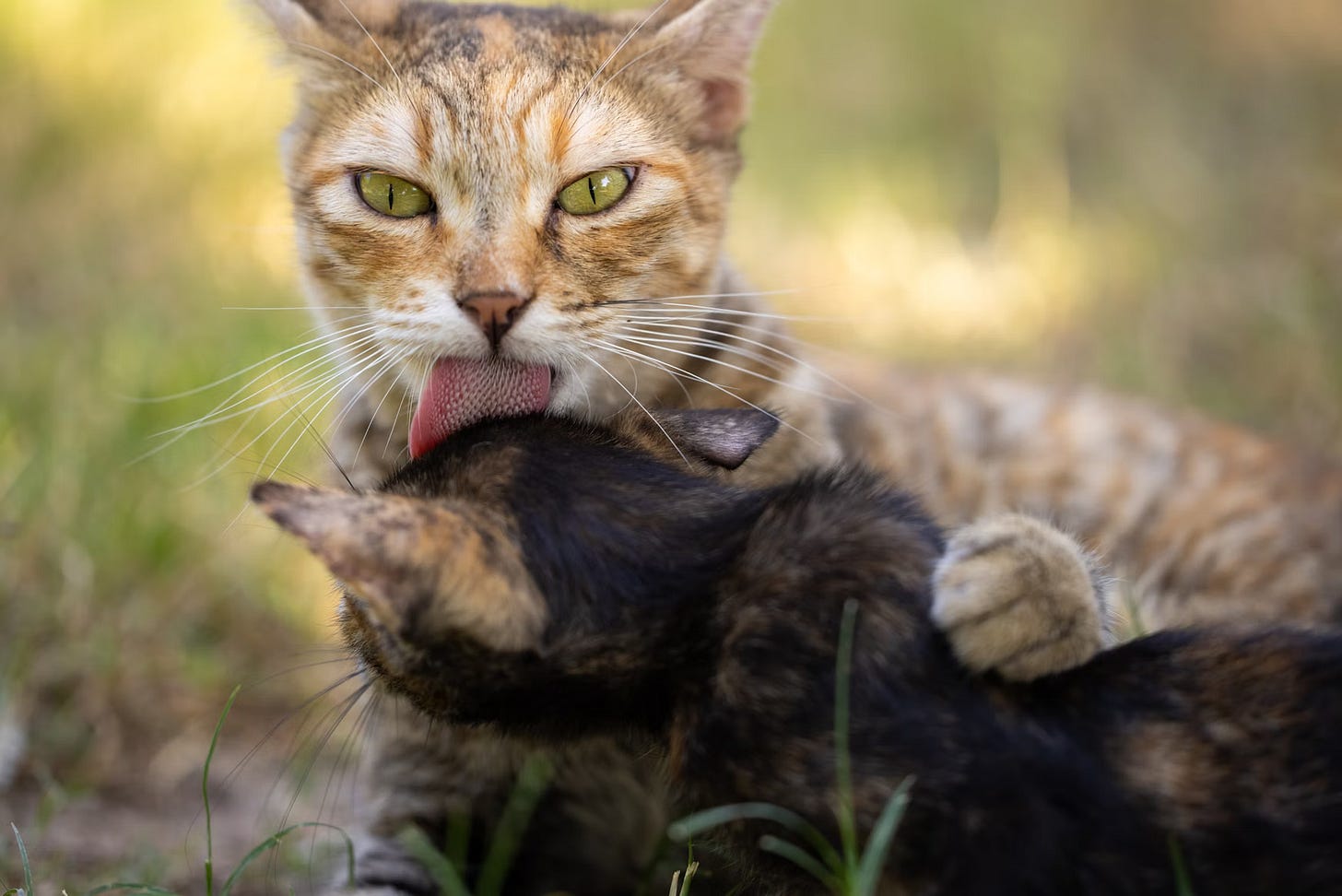"It’s Just Hairballs”… and Other Lies I Told Myself About My Cat’s Gut
A quiet clue I always ignored
Hey Whisker Crew,
We all know the gut plays a role in health—but I didn’t realize how much until I talked with Melissa Natanson this week on the Golden Whiskers Podcast.
Melissa is a holistic pet health coach who focuses on gut and kidney health. She’s worked with countless cats dealing with long-term issues like vomiting, itching, and digestive problems—many of which traditional food swaps or probiotics couldn’t fully resolve.
That’s where I learned about something totally new to me: FMT, or fecal microbiota transplantation.
I know, it sounds a little weird at first. But Melissa broke it down simply: while probiotics offer just a few strains of bacteria, FMT provides a full ecosystem—microbes, yeast, and short-chain fatty acid producers that actually help retrain the immune system.
The results? Cats who had battled IBD or chronic skin issues for years were improving—often completely—within 30 to 60 days.
You can listen to a 9 minute clip of my interview with Melissa here, as she explains it all.
✅ What to Watch For
One of the biggest lightbulb moments from my conversation with Melissa was realizing just how many signs of gut imbalance we dismiss as “normal cat stuff.”
I’ve done it myself. I remember brushing off Nomar’s frequent vomiting as just “eating too fast.” I assumed Mia’s occasional sneezing or overgrooming was seasonal. But Melissa challenged that mindset—and I’m glad she did.
She explained that gut dysfunction often doesn’t show up first in the litter box—it shows up on the skin. That itching, that scratching, that bald spot your cat keeps licking? It’s not always allergies or stress. Sometimes, it’s their gut sounding the alarm. 🛎️
Think about this:
Does your cat vomit more than once or twice a year?
Are they constantly grooming a certain area or losing fur in patches?
Do they sneeze often, or have watery eyes that don’t seem tied to anything specific?
Is their poop consistently soft, loose, or irregular?
Have they become less tolerant of certain foods lately?
These may not feel like medical emergencies—but according to Melissa, they’re often early red flags that the gut ecosystem is out of balance. And when left unchecked, that imbalance can spiral into chronic inflammation, IBD, IBS, or even strain the kidneys over time.
It all connects back to the gut’s massive role in the immune system—up to 70–90% of it lives there.
So when that system gets disrupted, the body’s responses start misfiring. It’s why your cat might suddenly react to pollen, to turkey, or even to you petting a certain spot. The immune command center has lost its calibration. 🧠
This made me think differently about everything I’d brushed off with Niko and Milo—because cats are subtle. And when they’re off, they rarely make a scene. Instead, they whisper through their bodies. We just have to know how to listen.
✅ Melissa’s Action Steps for Cat Parents
Based on what Melissa shared in this episode, here are a few clear ways you can start supporting your cat’s gut right now:
1. Pay attention to subtle symptoms.
Vomiting, skin issues, and grooming behavior are often gut-related. Don’t ignore them—even if they seem minor.
2. Know that most probiotics aren’t enough.
Many probiotic supplements only include a few strains. If your cat has long-term issues, ask your vet (or a holistic coach) about microbiome diversity or FMT as an option.
3. Support the gut to prevent deeper problems.
Gut imbalance can strain the immune system and kidneys over time. The earlier you intervene with diet and gut support, the better.
4. Track changes.
Keep a simple log of what you’re seeing—when your cat vomits, scratches, licks, sneezes, or has stool changes. Patterns tell the story.
5. Don’t wait for a crisis.
As Melissa said, cats hide things well. That doesn’t mean everything’s fine. Trust your instincts if something feels off.
🧡 What I’m trying with Niko & Milo
After hearing Melissa explain how many of these issues go unnoticed for years, I’m making two changes starting this week:
Watching for patterns I may have ignored (like vomiting or licking)
Staying consistent with moisture-rich meals
Being more mindful about rotating proteins
I don’t want to wait for a diagnosis to start supporting their gut health. Prevention starts now.
🐱 This Week’s Cattitude Prompt:
What’s one symptom your cat has that you’ve written off as “normal”?
Start tracking it. Write it down. Watch for patterns.
Your cat may be trying to tell you something—quietly.
🎧 Listen to this week’s episode:
"Why Your Cat's Vomiting, Itching, or Kidney Issues Might All Start in the Gut" with Melissa Natanson
👉 Click here to listen to the full episode now or search Golden Whiskers wherever you get your podcasts.
Thanks for reading, thanks for loving your cats, and thanks for being part of the Golden Whiskers family.
Until next time,
💛 Scott | Golden Whiskers 🐾




Well, this sounds like the infamous “fecal transplant” for humans. This interview does not prove any info on where to get these FMT capsules. Looking online I see many options for animals (and humans!) so it would be nice to have more practical help from this interview. And I am really sorry not to have known about this for my IBD kitty who died 2023…